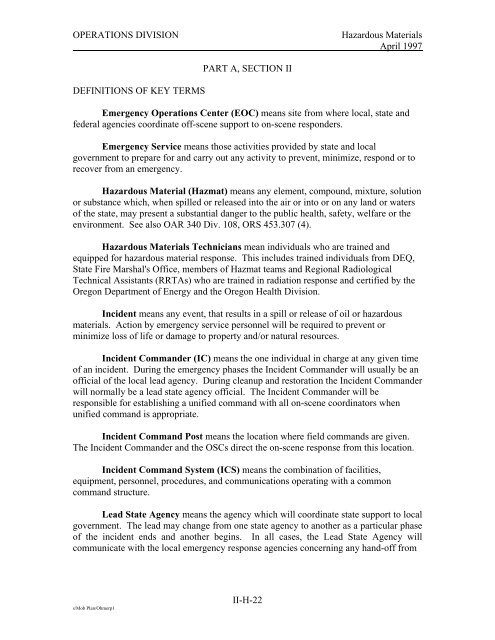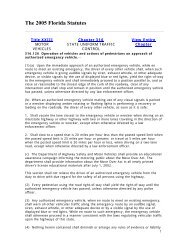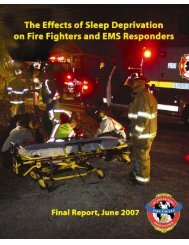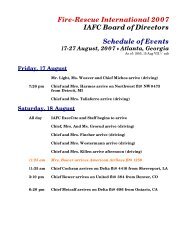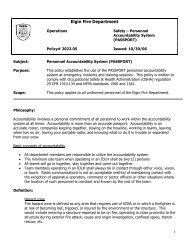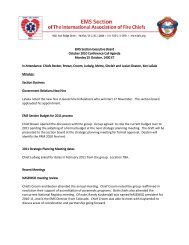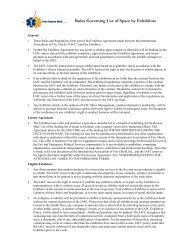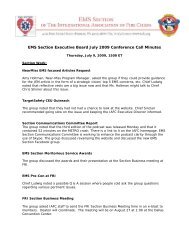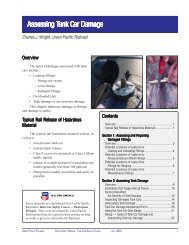oregon fire service mobilization plan - International Association of ...
oregon fire service mobilization plan - International Association of ...
oregon fire service mobilization plan - International Association of ...
You also want an ePaper? Increase the reach of your titles
YUMPU automatically turns print PDFs into web optimized ePapers that Google loves.
OPERATIONS DIVISION<br />
Hazardous Materials<br />
April 1997<br />
DEFINITIONS OF KEY TERMS<br />
PART A, SECTION II<br />
Emergency Operations Center (EOC) means site from where local, state and<br />
federal agencies coordinate <strong>of</strong>f-scene support to on-scene responders.<br />
Emergency Service means those activities provided by state and local<br />
government to prepare for and carry out any activity to prevent, minimize, respond or to<br />
recover from an emergency.<br />
Hazardous Material (Hazmat) means any element, compound, mixture, solution<br />
or substance which, when spilled or released into the air or into or on any land or waters<br />
<strong>of</strong> the state, may present a substantial danger to the public health, safety, welfare or the<br />
environment. See also OAR 340 Div. 108, ORS 453.307 (4).<br />
Hazardous Materials Technicians mean individuals who are trained and<br />
equipped for hazardous material response. This includes trained individuals from DEQ,<br />
State Fire Marshal's Office, members <strong>of</strong> Hazmat teams and Regional Radiological<br />
Technical Assistants (RRTAs) who are trained in radiation response and certified by the<br />
Oregon Department <strong>of</strong> Energy and the Oregon Health Division.<br />
Incident means any event, that results in a spill or release <strong>of</strong> oil or hazardous<br />
materials. Action by emergency <strong>service</strong> personnel will be required to prevent or<br />
minimize loss <strong>of</strong> life or damage to property and/or natural resources.<br />
Incident Commander (IC) means the one individual in charge at any given time<br />
<strong>of</strong> an incident. During the emergency phases the Incident Commander will usually be an<br />
<strong>of</strong>ficial <strong>of</strong> the local lead agency. During cleanup and restoration the Incident Commander<br />
will normally be a lead state agency <strong>of</strong>ficial. The Incident Commander will be<br />
responsible for establishing a unified command with all on-scene coordinators when<br />
unified command is appropriate.<br />
Incident Command Post means the location where field commands are given.<br />
The Incident Commander and the OSCs direct the on-scene response from this location.<br />
Incident Command System (ICS) means the combination <strong>of</strong> facilities,<br />
equipment, personnel, procedures, and communications operating with a common<br />
command structure.<br />
Lead State Agency means the agency which will coordinate state support to local<br />
government. The lead may change from one state agency to another as a particular phase<br />
<strong>of</strong> the incident ends and another begins. In all cases, the Lead State Agency will<br />
communicate with the local emergency response agencies concerning any hand-<strong>of</strong>f from<br />
s/Mob Plan/Ohmerp1<br />
II-H-22


